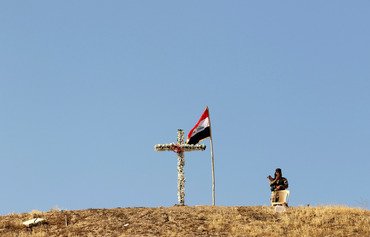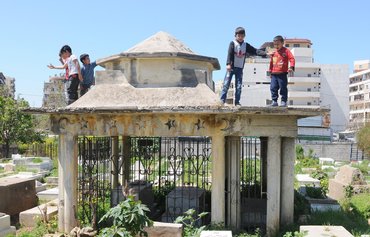In early December, a new school that serves Chaldean refugees in Lebanon opened its doors to children from that community, some of whom have not attended school for four years, and others of whom have never attended school.
The Chaldean Church in Lebanon opened the school -- in the Thomas the Apostle compound of Our Lady of Divine Mercy Pastoral Social Centre in Sad el-Baouchriyeh, east of Beirut -- in response to the community's growing need.
Many Iraqi and Syrian Chaldean children have not attended school since 2013, when their families first sought refuge in Lebanon, fleeeing the "Islamic State of Iraq and Syria" (ISIS), which had occupied their villages and towns.
The difficult financial circumstances these families face, coupled with the unfamiliar school curricula, have kept hundreds of children from attending school.
![Iraqi Chaldean children take part in an activity organised for them by the Our Lady of Divine Mercy Pastoral Social Centre in Sad el-Baouchriyeh in Lebanon. [Photo courtesy of the Our Lady of Divine Mercy Pastoral Social Centre]](/cnmi_am/images/2017/12/19/10769-chaldean-kids-activities-600_384.jpg)
Iraqi Chaldean children take part in an activity organised for them by the Our Lady of Divine Mercy Pastoral Social Centre in Sad el-Baouchriyeh in Lebanon. [Photo courtesy of the Our Lady of Divine Mercy Pastoral Social Centre]
To address this problem, the Chaldean patriarchy in Lebanon opened a school for them in partnership with the International Orthodox Christian Charities (IOCC) and World Vision.
A newly opened vocational training centre that offers English language, computer and accounting courses also will serve a number of refugee students.
The new school is "a real opportunity to provide an education to my son, as my financial situation has prevented him from enrolling in a Lebanese school", said Elias Awsaji, whose 5-year-old son, Andre, has never attended school.
"I could not register my only son in any school because the tuition is very high and I am unemployed," he told Al-Mashareq. "So, the opening of this school for Chaldean children is very important, not only for my son to receive an education but also for him to mix with other children and overcome his introversion."
Learning the basics
Suha Suleiman, of Tel Eskof, told Al-Mashareq the school will teach her daughters Malak, 9, and Nour, 5, to read and write, learn a foreign language and develop computer skills.
Suleiman's other two daughters, aged 12 and 14, are already going to school, she said.
"I had not yet registered the youngest two in school, because the income from my [domestic work] does not allow me to do so, and I am separated from my husband and cannot adequately provide for them," she explained.
"The school came as a relief for me, especially as it is near our home."
Less than a week after the school opened, 100 children had been enrolled, according to Arabic language teacher Maryam Janana Jamani, a refugee from al-Qush in Iraq's Ninawa Plain, whose areas of specialty are science and physics.
The school accepts students between the ages of 5 to 9, she said.
Most of the registered students "are in school for the first time, and need a lot of work to learn the basics, such as reading, writing and math", Jamani said.
Meeting an urgent need
Chaldean Bishop of Lebanon Michel Kassarji said the school and vocational training centre will address the "urgent need of Iraqi and Syrian refugees in Lebanon to educate their children".
Many have yet to attend school, he said, even though they have been in Lebanon for more than five years.
"Since ISIS overran their areas in Iraq and Syria, more than 4,000 Chaldean families have sought refuge in Lebanon," he said. "Since then, they have been living under very difficult circumstances that have prevented most families from enrolling their children in school."
Other reasons that have kept children from school include some families' belief that their presence in Lebanon would be a temporary transit stop before they moved on to their ultimate destinations in other countries, he said.
"When the families realised their stay in Lebanon would be an extended one, they could not register their children in Lebanese public schools, because the school curricula are different from Iraqi curricula," he said.
"The Lebanese government then allocated certain schools for them, but they could not enroll in them because they did not have residence permits."
Access to education
Faced with this reality, "we, as a church, could not sit idly while the Chaldean community’s children were not getting an education", Kassarji said.
"We decided to open a private school for Iraqi and Syrian refugees at the St. Thomas the Apostle compound" in the Sad el-Baouchriyeh district, Kassarji said.
The school, which occupies 500 square metres inside the compound, was provided with school furniture and other equipment.
Kassarji said the school was set up "to receive more than 1,000 Iraqi and Syrian refugee students aged five years and above, with 500 attending the morning session and 500 the afternoon session".
The school, which opened its doors to students on December 4th, helps them get an education from specialised teachers, under the supervision of the IOCC, he said.
"The school and the training centre are filling a void and meeting an urgent need for our people, who were forced by terrorist groups and their criminal actions against them to seek refuge in Lebanon," he said.

![Iraqi Chaldean children and their teachers pose for a group photo at the end of an activity the Our Lady of Divine Mercy Pastoral Social Centre in Sad el-Baouchriyeh organised for them. The centre recently opened a school and vocational training centre for Chaldean refugee kids in Lebanon.[Photo courtesy of the Our Lady of Divine Mercy Pastoral Social Centre]](/cnmi_am/images/2017/12/19/10768-chaldean-kids-school-600_384.jpg)






